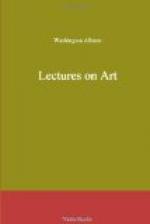form was not only displaced, but completely reversed,
by the revolting discovery of a moral discrepancy.
But while we admit, on the threshold, that the Correspondence
in question cannot be sustained as universally obvious,
it is, nevertheless, not apprehended that this admission
can affect our argument, which, though in part grounded
on special cases of actual coincidence, is yet supported
by other evidences, which lead us to regard all such
discrepancies rather as exceptions, and as so many
deviations from the original law of our nature, nay,
which lead us also rationally to infer at least a future,
potential correspondence in every individual.
To the past, indeed, we cannot appeal; neither can
the past be cited against us, since little is known
of the early history of our race but a chronicle of
their actions; of their outward appearance scarcely
any thing, certainly not enough to warrant a decision
one way or the other. Should we assume, then,
the Correspondence as a primeval law, who shall gainsay
it? It is not, however, so asserted. We
may nevertheless hold it as a matter of faith;
and simply as such it is here submitted. But faith
of any kind must have some ground to rest on, either
real or supposed, either that of authority or of inference.
Our ground of faith, then, in the present instance,
is in the universal desire amongst men to realize
the Correspondence. Nothing is more common than,
on hearing or reading of any remarkable character,
to find this instinctive craving, if we may so term
it, instantly awakened, and actively employed in picturing
to the imagination some corresponding form; nor is
any disappointment more general, than that which follows
the detection of a discrepancy on actual acquaintance.
Indeed, we can hardly deem it rash, should we rest
the validity of this universal desire on the common
experience of any individual, taken at random,—provided
only that he has a particle of imagination. Nor
is its action dependent on our caprice or will.
Ask any person of ordinary cultivation, not to say
refinement, how it is with him, when, his imagination
has not been forestalled by some definite fact; whether
he has never found himself involuntarily associating
the good with the beautiful, the energetic with the
strong, the dignified with the ample, or the majestic
with the lofty; the refined with the delicate, the
modest with the comely; the base with the ugly, the
brutal with the misshapen, the fierce with the coarse
and muscular, and so on; there being scarcely a shade
of character to which the imagination does not affix
some corresponding form.




